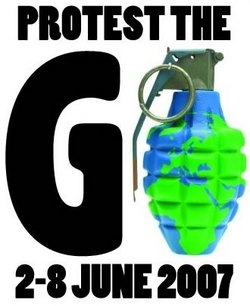Anti-G8 militants feeling rejuvenated after German police crackdown
Germany-G8-Violence
Militant opponents of the upcoming G8 summit, due to be held in the Baltic Sea resort of Heiligendamm from June 6-8, feel they have gained the momentum to stage violent protests during the meeting of world's richest nations following the recent police crackdown in several north German cities.
Radical leftist and anti-globalization groups have pointed out that Wednesday's police raids against the leftist militant scene will only increase tensions ahead of the G8 summit which may lead to major violence.
A spokesman for a German radical leftist group lashed out at the de-escalation strategy of the police.
"De-escalation is spelled differently," the weekly Der Spiegel news magazine quoted Benjamin Laumeyer as saying.
Pointing to "different forms of actions", Laumeyer would not rule out the chance of violence during the summit.
Another anti-globalization group 'Dissent Netzwerk' (Dissent Network) also refused to distance itself from violence.
"Every protest has its legitimacy," a spokesperson was cited as saying.
A member of the anti-G8 group 'Block G8' accused police of working on an escalation strategy.
"We want to prevent an escalation but it is not only in our hands", said Christoph Kleine.
The recent police sweeps have led to a renewed solidarity wave in the leftist camp, triggering massive mobilization efforts.
Only hours after the police raid, thousands of people took to the streets of Berlin and Hamburg, leading to brief violent protests.
"We have never had such a mobilization potential," said Carl Kemper of 'Dissent Netzwerk'.
Even more moderate groups of the anti-G8 movement, among them church and youth groups, trade unions and leftist parties, have at least for now displayed solidarity with the more radical elements.

Moderate and radical anti-globalization activists had been involved in heated discussions in recent weeks over how to protest during the G8 meeting.
"There is an ongoing debate among anti-globalization groups as to how to protest during the G8 summit. Some are calling for soft actions but some are calling for more violent measures such as blocking airports and throwing stones," said the spokesman of a Berlin-based VENRO non-government agency, Gerhard Gad.
"Groups like Attac have harsher positions," he added.
The anti-globalization organization Attac had strongly condemned Wednesday's police raids urging massive anti-G8 protests.
"Our slogan is 'More than ever now: Support G8 protests!," Attac was cited saying in a statement.
"We won't let ourselves to be intimidated. We will continue our information and mobilization campaign against the neo-liberal world economic policy and aggressive war policies of G8 members," it added.
Tens of thousands of people are expected to demonstrate against the G8 summit as a record number of 16,000 police will be deployed to contain the protests, making it the largest security operation in the history of Germany.
Protestors will also try to stage a sit-in at the military airport in the northern city of Rostock-Laage where the G8 delegations are due to land, in a bid to block their arrival.
The latest threats by hardline anti-globalization groups have further alarmed German security officials in the wake of a series of fire-bombings on the homes and vehicles on political and industrial leaders in Berlin and Hamburg.
German authorities warned that they will show no mercy on militants seeking to disrupt the G8 summit.
The Interior Minister of Mecklenburg-West Pommerania Lorenz Caffier, whose state will host the summit, announced police had the powers to impose up to 10 days of preventive custody on potential offenders.
"We also have the possibility of speeding up court proceedings. We will do everything to ensure a peaceful summit," added Caffier.
Interior Minister Wolfgang Schaeuble has already said that Germany will reinstate border controls in a bid to prevent potential terrorists and anti-globalization militants from entering the country.
There also plans for a suspension of the so-called Schengen accord which allows passport-free travel arrangements for many European Union countries.
Police has established a special nationwide commission, codenamed 'Kavala' whose primary function is to focus on all security issues related to the G8 meeting.
As part of the security measures, police have constructed a 2.5- meter-tall barbed wire security fence around the conference site.
The cost of the 13-kilometer fence, equipped with closed-circuit video cameras, is around 12.5 million euros.
The fence is also aimed at stopping anti-G8 militants from approaching the conference center.
Protestors have already announced that they wanted to get as close to the site of the G8 meeting as possible.
[http://www2.irna.ir/en/news/view/menu-234/0705122950150821.htm]
Images:

/




